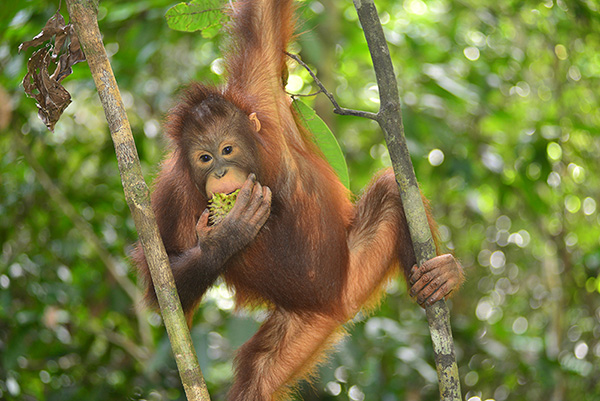
Thanks to your support, our newest rescue Charlotte can now look forward to a life of freedom!
In exciting news, our Sumatran Rescue Alliance (SRA) Rescue Centre was officially launched by Indonesia’s Vice Minister of Environment and Forestry, Alue Dohong on 13 January 2022. Our alliance partners from the Orangutan Information Centre and Centre for Orangutan Protection as well as Hardi Baktiantoro, The Orangutan Project's Field Manager, attended the launch.
The centre was constructed in 2020 under the authority of the North Sumatra Natural Resources Conservation Center and the Aceh Natural Resources Conservation Center. Since its completion, it has become the home for rescued Sumatran wildlife, including orangutans Asto and Asih, our newest adoption pair. These two young females were rescued together in 2021, moments before they were due to be sold onto a buyer.
In a press statement issued from the launch, Alue Dohong said that the construction of the wildlife rescue centre was part of an effort to fulfill the obligation to protect nature.
This beautiful rescue and rehabilitation centre is just one of the many ways that we’re protecting nature and securing the future for orangutans. We are currently working with authorities to rescue orangutans that have been stolen from their Indonesian forest home.
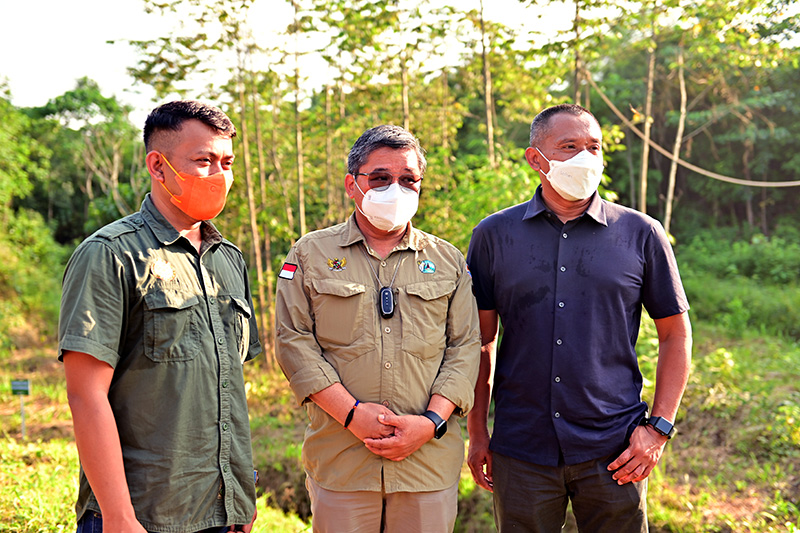
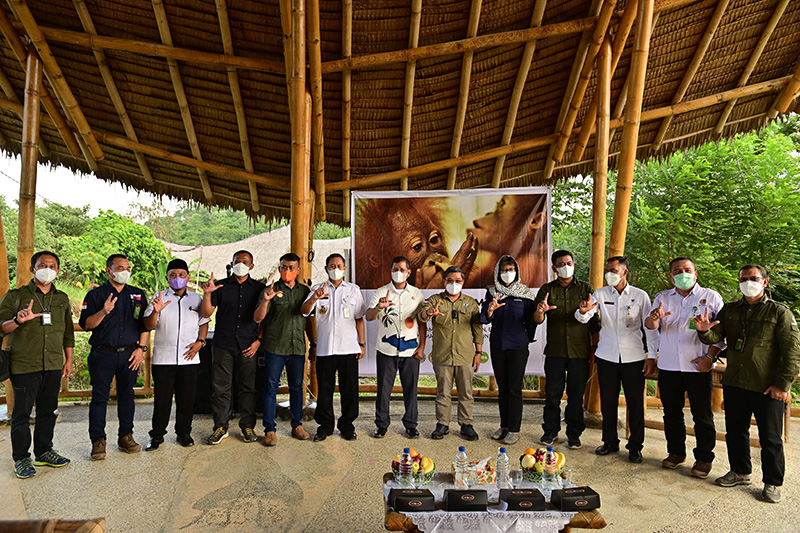
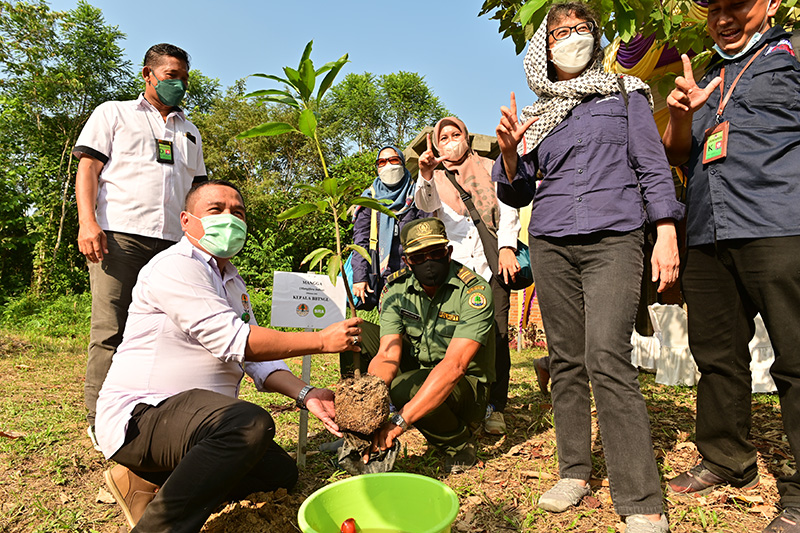
Above left: Panut (OIC) and Hardi (TOP) with Vice Minister; Above centre: Attendees at the opening ceremony; Above right: The Vice Minister planting a tree in the SRA grounds
The Bornean Orangutan Rescue Alliance was founded by long term partners The Orangutan Project, and the Centre for Orangutan Protection (COP). We have numerous teams in the field including the APE Crusader and APE Warrior that investigate and confiscate illegally held captive orangutans. A new APE Crusader vehicle was purchased in 2021 to facilitate the extensive and rough terrain this team covers to rescue orangutans and investigate illegal activities
Most of the rescued orangutans are young, orphaned orangutans whose mothers have been brutally killed. Once rescued from often squalid conditions, these vulnerable orphans will undergo a full medical check and quarantine period at our BORA orangutan rescue and rehabilitation centre in the province of Berau in East Kalimantan before being introduced to other orangutans at the centre. Many confiscated orangutans are very young and require around the clock including regular milk feeds.
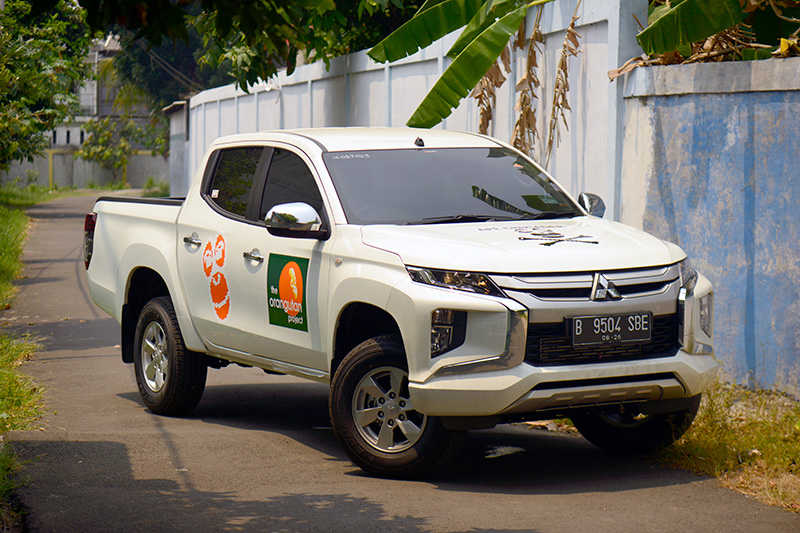

The new APE Crusader vehicle and young orangutan Charlotte who was rescued in July 21
After the young orangutans have completed their quarantine period, they can then take part in Jungle School where they develop the required skills needed for release into the forest. These skills include nest building, traveling in the canopy and being able to identify and access various forest food sources including fruits, leaves, bark, cambium, and insects. Young orangutans spend many years learning these skills from their mother in the forest, so the rehabilitation journey is a slow process. Orangutans develop at different rates depending on their age, temperament and how long they spent with their mother in the forest.
It has been a very tough six months in Indonesia with COVID-19 cases increasing dramatically. Jungle School had to be temporarily paused in July and August 2021 at our BORA centre to further protect the orangutans. The staff adhered to very strict protocols and stayed at the BORA rescue centre for two weeks at a time while they cared for the orangutans, so they were not exposed to the risk of COVID-19 in the community. All staff had to have a negative COVID-19 test before entering the rescue centre.
In early September, the orangutans had the first opportunity to return to Jungle School. All the orangutans seemed excited and very eager to be back outside and the keepers loved watching them play together and enjoy their time back in the forest. BORA staff are wearing full PPE when they take the orangutans out to Jungle School but thankfully the young orangutans don’t seem too phased about being carried by ‘space men.’ The lure of the jungle is obviously very strong!
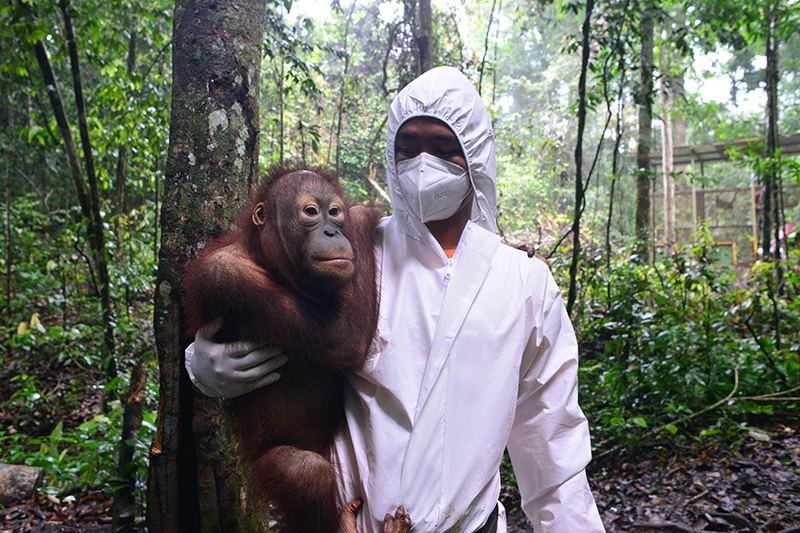
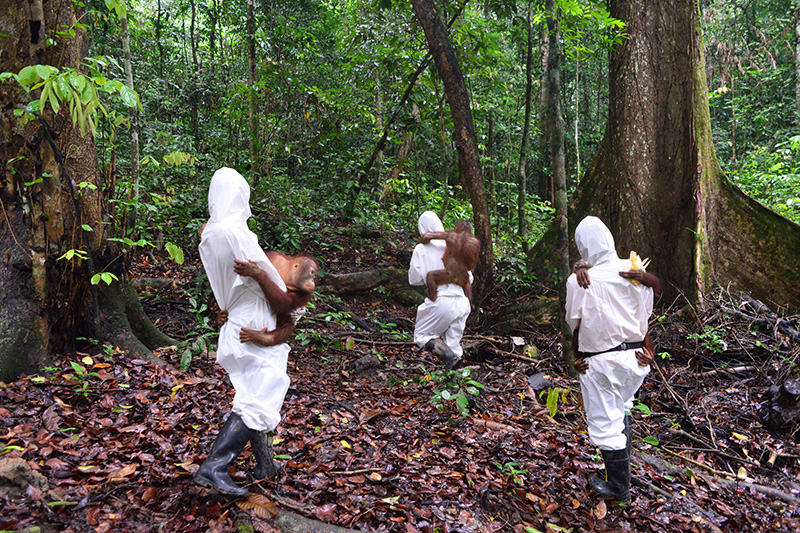
Jungle School certainly looks different these days, but the orangutans don’t seem to mind!
The current BORA Rescue Centre land in Berau, East Kalimantan, is not owned by us, but the Indonesian government. Due to the uncertainty of the future of this land and nearby coal mining, it was decided that it was safer to purchase our own land and build a new and better centre. A 2.5 hectare area of land was purchased in Berau in 2020. It contains mostly flat and some hilly forest which will be used for Jungle School. Fresh groundwater can be accessed, and land is also available for future expansion.
Construction on this new centre commenced in November 2021 and excellent progress has been made. The photos below show construction during the first four weeks including setting up signs, digging out the ground and levelling it out, laying cables that will go underneath the centre and pouring concrete for walls.
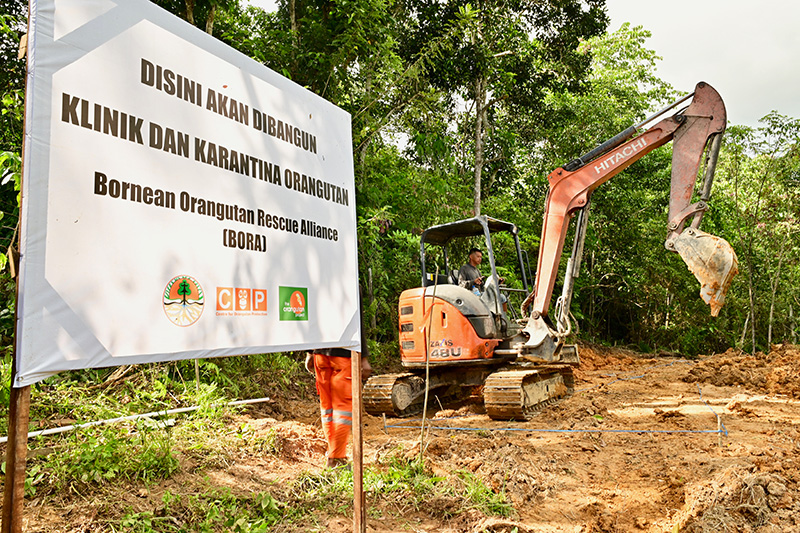
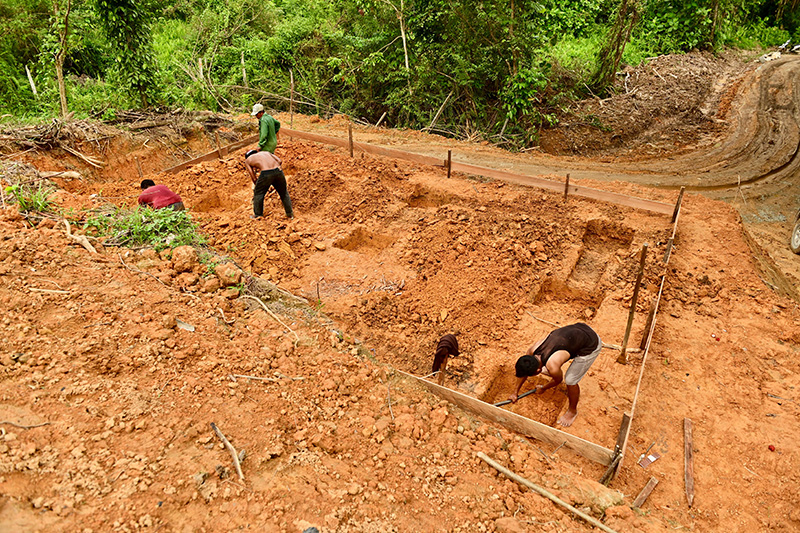
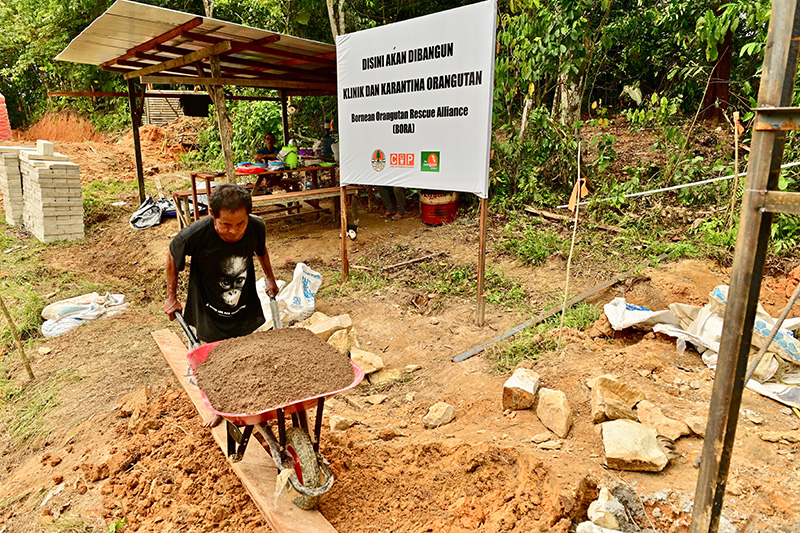
Forest Community Education and Conservation Program
The Orangutan Project supports a Community Education and Conservation Program (CECP) that was created in late 2019 by the Sustainable Green Sumatra Foundation based in Medan, North Sumatra. CECP delivers formal and informal education programs to schools and villages and works with local farmers near Gunung Leuser National Park (GLNP) to reduce human-wildlife conflicts by enhancing agroforestry techniques that improve productivity on existing farm and community forestland.
The goal of CECP is to address the main threats that compromise effective GLNP management and preserve the Park’s valued biodiversity focusing on orangutans. Through our community work, we aim to reduce human-animal conflict, discourage new forest clearings, develop alternative sources of income in the villages, and engage with the communities in forest restoration projects. Through a Memorandum of Understanding with the Government officials at GLNP, forest restoration is being undertaken within the National Park as well as biodiversity monitoring to better assess and protect wildlife within and outside the protected area.
The main objectives for CECP are to -
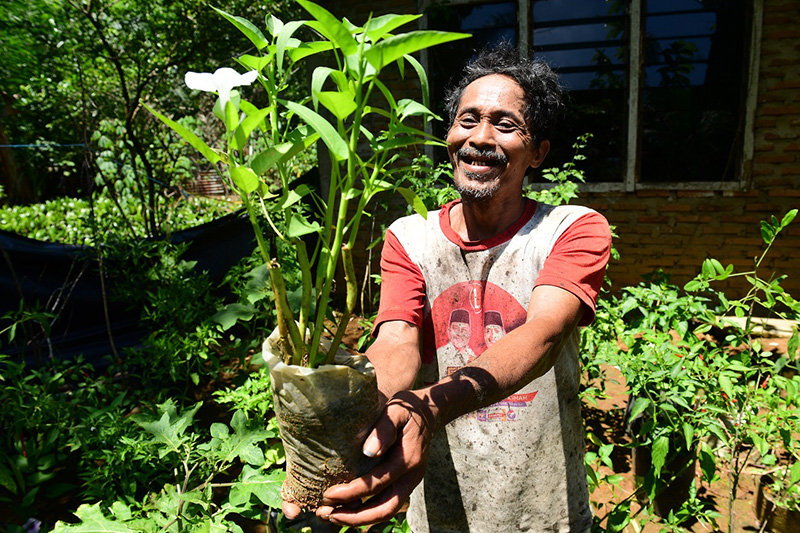
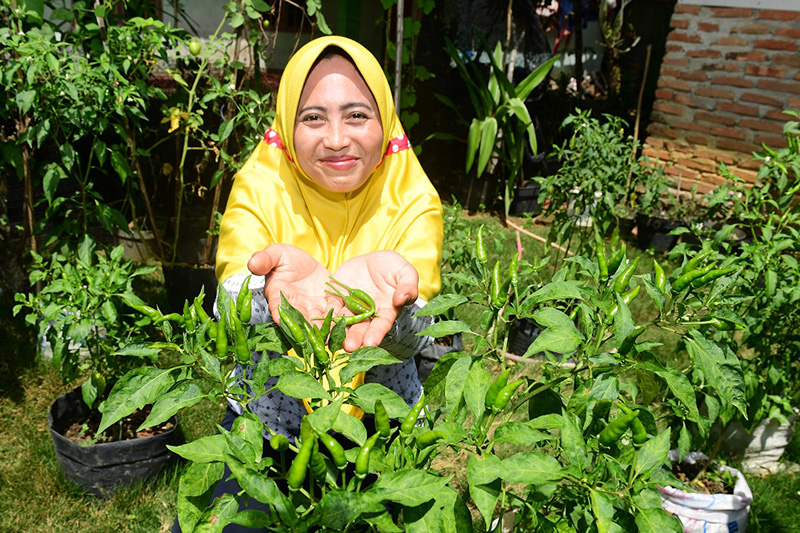
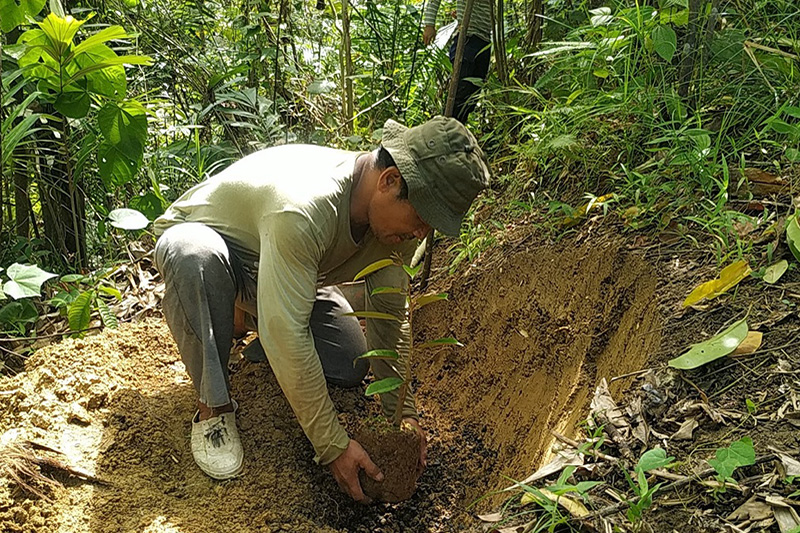
Local people learning more sustainable and higher yielding gardening techniques
Thank you for your continued support and commitment to protecting and conserving the Critically Endangered orangutan and its rainforest habitat.